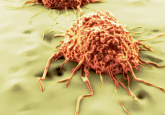Novel method to identify biomarkers that may indicate prognosis of liver cancer

Researchers at Cold Spring Harbor Laboratory (NY, USA) have developed a novel method to identify biomarkers for the most common form of liver cancer, hepatocellular carcinoma.
“This study underscores the potential for learning how RNA splicing variants can contribute to cancer and points to these variants as potential biomarkers for cancer progression,” explained team leader, Adrian Krainer (Cold Spring Harbor Laboratory).
Liver cancers have much genetic diversity and patients are prone to relapse. Hence, identifying biomarkers to predict the progression of the disease is of critical importance. The team believes their method could be utilized in other cancer types too.
Many diseases are implicated in RNA splicing errors, as this can lead to non-functional proteins or proteins with altered functions. RNA splicing irregularities have been identified in liver cancer cells.
The study, published in Genome Research, outlines a method that analyzes all differently spliced RNA molecules from a given gene, which the team tested by sampling HCC cells from hundreds of patients.
“If we can do this, AFMID splicing can become a therapeutic target and the source of a new drug for liver cancer,” concludes study leader, Kuan-Ting Lin (Cold Spring Harbor Laboratory).
They discovered that particular splicing isoforms of the AFMID gene correlated with poor patient prognosis, as these variants led cells to manufacture different versions of the AFMID protein.
In liver cancer cells, the altered versions of AFMID protein are associated with mutations in tumor-suppressor genes called TP53 and ARID1A. The team suggests that this is caused by low levels of NAD+ that is involved in DNA repair.
It is hoped that restoring missing exons to AFMID’s RNA code might raise NAD+ to normal levels and prevent mutations in TP53 and ARID1A.
Preliminary experiments have proven the team’s hypothesis, with over-expression of normally spliced AFMID leading to higher NAD+ levels and slowing down the growth of liver cancer cells.
Sources: Lin KT, Ma WK, Scharner J, Liu YR, Krainer AR A human-specific switch of alternatively spliced AFMID isoforms contributes to TP53 mutations and tumor recurrence in hepatocellular carcinoma. Genome Res. doi:10.1101/gr.227181.117 (2018) (Epub ahead of print); www.eurekalert.org/pub_releases/2018-03/cshl-nmi030218.php





